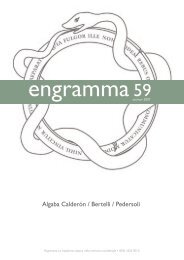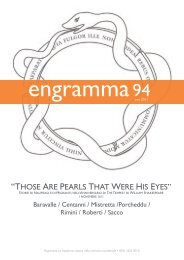Daniela Sacco, Pensiero in azione. Bertolt Brecht ... - Engramma
Daniela Sacco, Pensiero in azione. Bertolt Brecht ... - Engramma
Daniela Sacco, Pensiero in azione. Bertolt Brecht ... - Engramma
You also want an ePaper? Increase the reach of your titles
YUMPU automatically turns print PDFs into web optimized ePapers that Google loves.
<strong>Daniela</strong> <strong>Sacco</strong><br />
Qe 03• <strong>Pensiero</strong> <strong>in</strong> <strong>azione</strong><br />
th<strong>in</strong>g where someth<strong>in</strong>g is both reality and mythology: so <strong>in</strong> this moment <strong>in</strong> history, that place is<br />
both very present and very far away, and it presents us with certa<strong>in</strong> th<strong>in</strong>gs that we have been<br />
imag<strong>in</strong><strong>in</strong>g, <strong>in</strong> many parts of the world.<br />
D.S.<br />
Do you th<strong>in</strong>k that mythology could substitute of history?<br />
Peter Sellars<br />
Between history and mythology there is only an <strong>in</strong>terplay: history is what somebody said<br />
happened, so it's already mythology. I'll try to expla<strong>in</strong> myself better: th<strong>in</strong>k about an event. You<br />
were not there, but if you were there, you only saw what you could see and the event is always<br />
bigger than what you could see of it. So every time we describe someth<strong>in</strong>g, it's mythology<br />
because we don't have a complete vision and we have to depend on what somebody else tell us.<br />
It's only by this act of hear<strong>in</strong>g, only by enter<strong>in</strong>g <strong>in</strong>to this mythical sphere that we can form a<br />
more complete idea.<br />
D.S.<br />
To come back to montage, <strong>in</strong> relation to what we have already said: do you believe that<br />
montage has a particular function <strong>in</strong> relation to the narrative construction and could it enter<br />
<strong>in</strong>to the relationship between truth and fiction?<br />
Peter Sellars<br />
What it is powerful about montage is that <strong>in</strong>terrupts normal narrative flow and it sharpens the<br />
edges of truth. Normal narrative flow goes along with whatever is happen<strong>in</strong>g, but montage<br />
questions each development, and it puts each development up for exam<strong>in</strong>ation by creat<strong>in</strong>g a<br />
situation which looks at someth<strong>in</strong>g from different angles <strong>in</strong>stead of from only one po<strong>in</strong>t of view.<br />
That's why montage becomes very powerful. You realize that history, that reality are composed<br />
of different facets like the eye of a house fly: and the more different facets you see, the more<br />
multi-dimensional reality becomes. So narrative is not a s<strong>in</strong>gle narrative, it's not a s<strong>in</strong>gle image,<br />
it's not a s<strong>in</strong>gle montage: every narrative is "multiple". Everyth<strong>in</strong>g is "multiple" and therefore<br />
there is room for meta-narratives and multi-narrative. There is a large narrative that is beh<strong>in</strong>d<br />
the story which is be<strong>in</strong>g told and there are many smaller narratives that haven't been <strong>in</strong>cluded <strong>in</strong><br />
the story which is beign told. And so we know that all these other narratives could, at any<br />
moment, <strong>in</strong>tersect with other narratives.<br />
D. S.<br />
Probably, when you decide to cut a scene it's always a political act...<br />
Peter Sellars<br />
Yes, and whenever the master narrative is <strong>in</strong>terruped, that's a good sign. That's why it's so<br />
important to make fragments: because everybody knows that the master narrative is a "lie". The<br />
big Hollywood movie, complete with swell<strong>in</strong>g orchestral music, is a total lie! Interrupt<strong>in</strong>g it is a<br />
good sign! The only th<strong>in</strong>g that we can trust is a small moment of truth that we can verify. We<br />
can work with these fragments. We can recomb<strong>in</strong>e fragments <strong>in</strong> whatever way: our lives, our<br />
societies have been broken, but out of everyth<strong>in</strong>g that has been broken, we pick up small pieces<br />
and put them together...<br />
Kurtág, for example, wrote Kafka Fragmensts out of his experience of beign a refugee: but what<br />
does it mean? That when you escape under the fence, you have to abandon your previous life.<br />
And all that rema<strong>in</strong>s is a few fragments, you hold on to them and from those fragments you<br />
60











